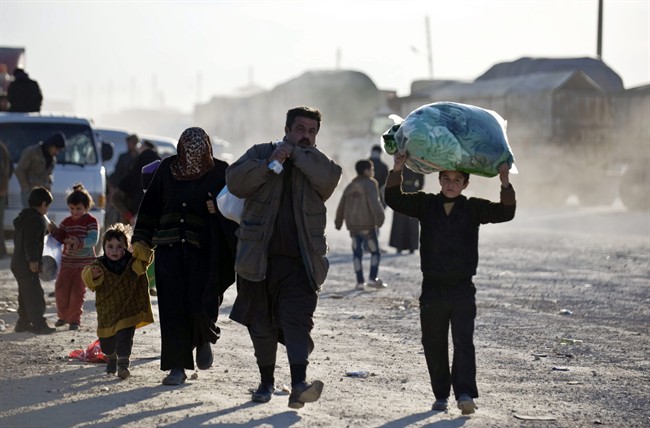OTTAWA – The dollars are still being counted, but the amount of money donated by Canadians for overseas Syrian relief efforts will likely fall well short of the maximum $100 million the government had promised to match.

Monday marked the final day for Canadians to give money for Syrian aid in order to ensure those dollars were matched by the federal government.
Upwards of $16 million in donations had been received by Monday by UNICEF, World Vision and the Red Cross, but several other groups taking part have not released their figures.
The program, launched by the Conservatives, was set to close at the end of 2015 but the Liberals extended the deadline to raise more money.
At the time the government announced the extension, about $12 million had been raised since the program launched last September.
READ MORE: We’ve done the right thing: McCallum on Canada’s 25,000 Syrian refugees

Get breaking National news
Since January 2012, Canada has committed $653.5 million in humanitarian assistance in response to the Syria crisis.
Previously, the government had only used matching funds in response to natural disasters.
In the aftermath of the 2010 earthquake in Haiti, the government matched $220 million in donations; the 2013 relief program for Typhoon Haiyan saw $85.6 million raised.
The Syrian fund was created by the Conservatives in response to a surge in Canadian demand to do more to help alleviate the massive humanitarian crisis caused by the nearly five-year old Syrian civil war.
Some estimates put the number of people killed in the war or forced the flee their homes at 11 million. Those who remain struggle for secure access to water, food and often times shelter.
Meanwhile, more than 4.7 million people have registered as refugees with the United Nations in countries in the region, while hundreds of thousands more have fled on their own to try and find safety in Europe.
READ MORE: Europe’s crisis worsens: Migrants face razor wire, tear gas
Among them was the family of Alan Kurdi. The toddler drowned as his family fled; a photograph of his dead body on a Turkish beach captured the imagination of the world and made him a household name around the world.
Kurdi had relatives in Canada, which for many brought the crisis home.
Most international relief organizations had been fundraising for years to support humanitarian efforts inside Syria and in the surrounding countries, but the photograph prompted an increase in donations.
In 2013, the Humanitarian Coalition ran a three-month ad campaign for Syrian relief and netted $550,000. In the week after the photo appeared, they raised half that without making a single call.
READ MORE: 5 things to know about the Syrian refugee resettlement program
UNICEF spokeswoman Tiffany Baggetta said donations to her organizations also spiked in September but then dipped for the rest of last year.
“We have seen an increase in donations to our Syrian crisis response through January and February – particularly in the last couple of weeks,” she said in an email.







Comments